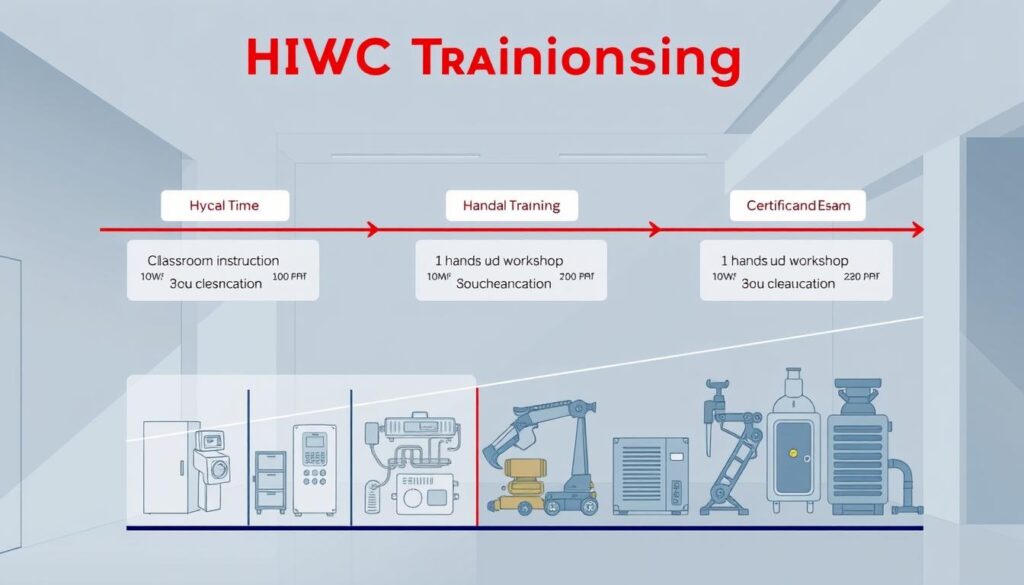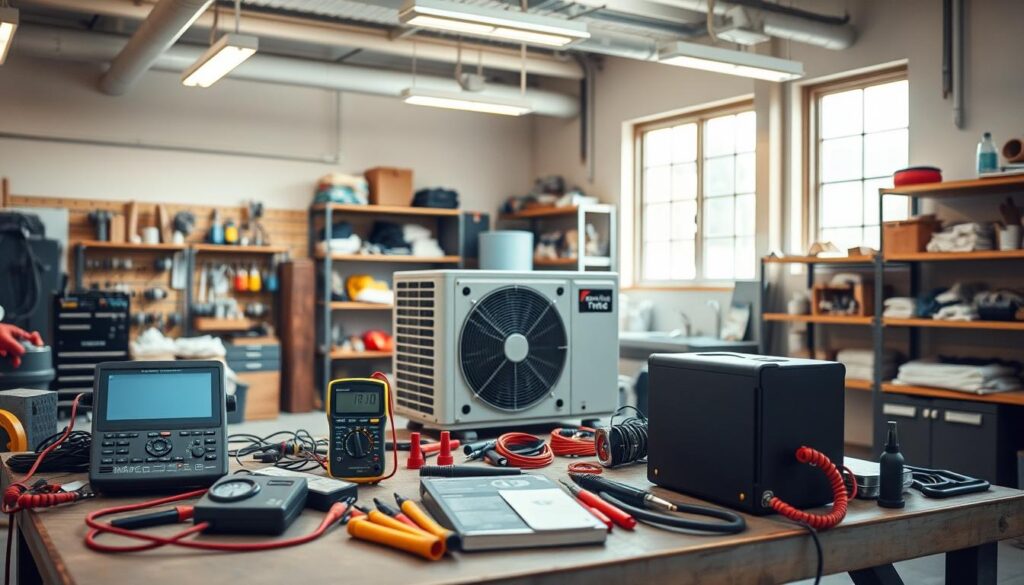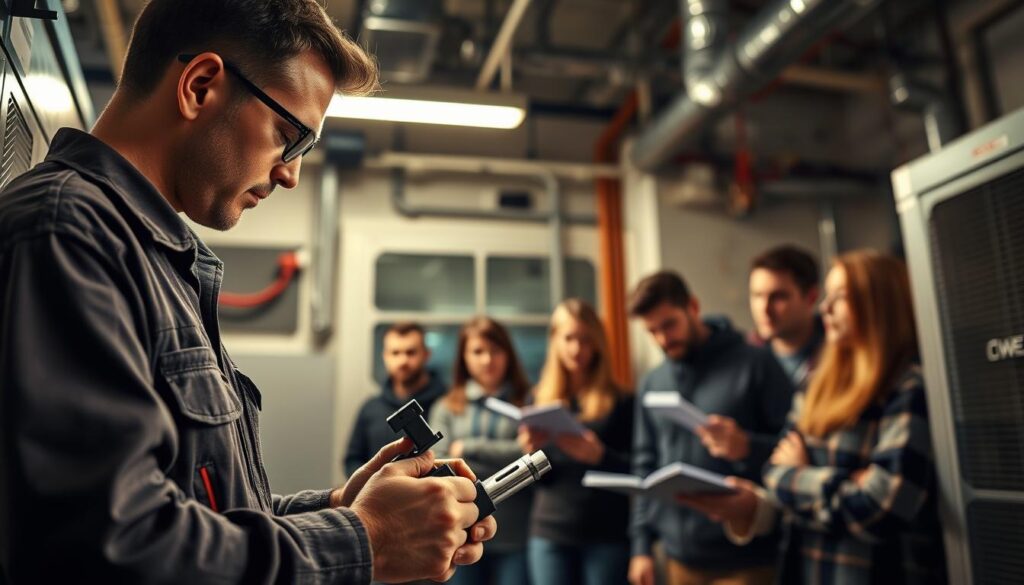Affiliate Disclosure
HVAC Guide Guys is a participant in the Amazon Services LLC Associates Program, an affiliate advertising program designed to provide a means for sites to earn advertising fees by advertising and linking to Amazon.
How Long HVAC Course Takes to Complete? Are you thinking about switching to a high-paying HVAC career? You might be surprised at how fast you can start. The United States Bureau of Labor Statistics shows this field is growing fast. This means your dream job could be just a few months away.

The time it takes to finish HVAC training varies. You can choose from quick certifications to full degrees. Knowing the right training is key to earning a median salary of $48,730.
HVAC courses last from 6 months to 3 years. This depends on your goals and what you want to achieve. You can find training at technical schools, community colleges, and specialized programs.
Key Takeaways
- HVAC training programs range from 6 months to 3 years
- Median annual wage for HVAC technicians is $48,730
- Growth rate for HVAC professionals exceeds average job markets
- Multiple educational paths are available for aspiring technicians
- Certification requirements vary by state
Table of Contents
Understanding the HVAC Training Landscape
The HVAC industry is full of exciting career paths for those who love technical and hands-on work. It’s expected to grow by 9% from 2023 to 2033. This makes it a great choice for those looking to start a new career.
Looking into HVAC certification length, you’ll find many ways to get started. The time it takes to complete a program varies:
- Certificate Programs: 3-9 months
- Diploma Programs: 1 year
- Associate’s Degrees: 2 years
- Online Training Programs: Approximately 12 months
Exploring Program Diversity
There are many HVAC programs out there. They fit different learning styles and career goals. You can find programs at technical schools, community colleges, and specialized training centers. They mix theory with practical skills.
Career Prospects in HVAC
HVAC technicians made a median of $57,300 in 2023. You can earn more by getting special certifications. Learning about new tech like energy-efficient systems and smart homes is also key.
Industry Growth and Demand
The HVAC industry is growing thanks to new tech and a focus on saving energy. Cities and areas with extreme weather need skilled technicians. Staying up-to-date with new skills can open up big career doors in this field.
Explore Our HVAC Shop
Looking for top-rated HVAC tools, parts, and accessories? Visit our shop and find the perfect solution for your needs.
Visit the ShopHow Long HVAC Course Takes: Program Duration Options
Exploring HVAC education means understanding the course schedule. This is key for planning your career. Training programs have different lengths to meet various needs and goals.
The length of your HVAC education varies based on the program. You can choose from:
- Certificate Programs: 6-9 months
- Trade School Programs: 6-12 months
- Associate Degree Programs: 18-24 months
- Apprenticeship Programs: 2-5 years
Several factors influence how long your HVAC training takes. Full-time students finish faster. Part-time learners might take longer to balance work and school.
Many schools offer flexible schedules. This helps fit classes into your lifestyle:
- Morning classes (7:30 AM – 12:30 PM)
- Afternoon classes (1:00 PM – 6:00 PM)
- Evening classes (6:30 PM – 11:30 PM)
Most HVAC programs last about 100 contact hours. This includes lectures and lab work. Your chosen path will decide how much time you need to start your HVAC career.
Explore Our HVAC Shop
Looking for top-rated HVAC tools, parts, and accessories? Visit our shop and find the perfect solution for your needs.
Visit the ShopCertificate Programs vs. Associate Degrees in HVAC
Choosing the right HVAC educational path is key to your career. The time you spend studying will depend on the program you choose. Knowing the difference between certificate programs and associate degrees helps you decide on your HVAC training.
- Certificate Programs
- Associate Degree Programs
Certificate Program Timeline
Certificate programs are quick and to the point. They usually take six to 12 months to finish. The benefits are:
- You can start working sooner
- They cost less overall
- They prepare you for the EPA Section 608 certification
Associate Degree Requirements
An Associate of Science (AS) in HVAC technology gives you a deeper education. These programs take 18 to 24 months to complete. The advantages are:
- You get more technical knowledge
- There are more chances for career growth
- You’re ready for various industry certifications
Comparing Program Benefits
Both programs can lead to an HVAC career, but associate degrees offer more training. Starting salaries are similar, but long-term career chances are different. Certificate holders can start working fast, while associate degree holders have a shot at management roles.
Your career goals and personal circumstances will determine the best educational path for your HVAC journey.
HVAC Apprenticeship Programs and Their Duration
HVAC apprenticeship programs are a great way to start your HVAC career. They mix classroom learning with real-world experience. This makes you a skilled technician.
These programs usually last three to five years. You’ll learn a lot of skills. You’ll get both classroom knowledge and practical experience.
- Classroom Training: Approximately 600 hours of technical education
- Practical Work Experience: Supervised on-site training
- Comprehensive Skill Development: Learning advanced HVAC techniques
“Apprenticeships provide the most immersive learning experience in the HVAC industry, allowing students to earn while they learn.” – HVAC Professional Association
Apprenticeship programs have several key parts:
| Program Aspect | Details |
|---|---|
| Total Duration | 3-5 years |
| Classroom Hours | 600 hours |
| Practical Training | Paid on-the-job experience |
| Certification Outcome | Journeyman HVAC Technician |
Starting your apprenticeship will set you up for a great HVAC career. You can work in homes, businesses, or factories. After finishing, you’ll be ready for professional certification.
Explore Our HVAC Shop
Looking for top-rated HVAC tools, parts, and accessories? Visit our shop and find the perfect solution for your needs.
Visit the ShopFactors Affecting HVAC Training Timeline
Your HVAC training time can change a lot based on several important factors. Knowing these helps you plan your education better. It also lets you know what to expect from your HVAC program timeframe.
Many things can change how long your HVAC training lasts. Let’s look at the main things that affect your learning:
Study Commitment: Full-Time vs. Part-Time Options
How you study affects how long your HVAC training takes. Students who study full-time usually finish faster. But, those who study part-time might take longer because they have to work or take care of family.
- Full-time students: Complete training in 6-12 months
- Part-time students: May require 18-24 months
- Flexible scheduling helps balance education with other responsibilities
Prior Experience and Skill Levels
If you already know a lot about mechanics, you can learn HVAC faster. Students with mechanical or technical skills learn quicker.
- Mechanical background reduces learning curve
- Prior electrical or technical experience benefits learning
- Skilled students might complete training faster
State Licensing Requirements
Every state has its own rules for HVAC licenses. Some states need more classes, apprenticeships, or special certifications before you can work.
- Research your state’s specific HVAC licensing requirements
- Contact local licensing boards for precise guidelines
- Prepare for possible extra training hours
Pro tip: Always check your state’s specific requirements for a smooth HVAC career start.
Explore Our HVAC Shop
Looking for top-rated HVAC tools, parts, and accessories? Visit our shop and find the perfect solution for your needs.
Visit the ShopHands-on Training Components and Time Investment

Hands-on training is key in HVAC education. Your schedule will include lots of practical parts. These parts turn classroom learning into skills you can use on the job.
At top schools, you’ll spend a lot of time learning by doing. This is how you get good at working with HVAC systems.
The hvac education timeline for hands-on training covers important areas:
- System installation techniques
- Diagnostic troubleshooting
- Equipment maintenance procedures
- Safety protocol implementation
Most HVACR training programs give 600-900 hours for practical training. These sessions make sure you’re ready for real-world challenges.
“Practical experience is worth more than theoretical knowledge in the HVAC industry.” – Industry Expert
You’ll get to use real tools and work on real problems. Schools like Universal Technical Institute teach you everything from basic electrical to complex refrigeration.
| Training Component | Typical Time Investment |
|---|---|
| Basic System Installation | 120-180 hours |
| Diagnostic Procedures | 100-150 hours |
| Safety and Certification Prep | 60-90 hours |
| Advanced Troubleshooting | 150-200 hours |
Spending time on hands-on training is key to success in HVACR. It’s not just about knowing things. It’s about using that knowledge in real situations.
Accelerated HVAC Programs and Fast-Track Options
If you want to start your HVAC career fast, accelerated programs are a great choice. They let you enter the field quickly with less time spent in training.
These programs last from 4 to 6 months. They are perfect for those who want to start working sooner. Compared to traditional two-year degrees, they save a lot of time.
Intensive 7-Month Training Options
Some schools offer quick HVAC programs to get you ready for work fast. These programs include:
- Focused technical training
- Condensed learning schedule
- Practical hands-on experience
- Preparation for industry certifications
Flexible Learning Formats
Today’s HVAC training programs are flexible to meet different student needs:
- Evening Classes: Great for those who work
- Weekend Sessions: Good for those with busy lives
- Online Learning Components: Adds more flexibility
Program Highlights
Schools like the National Technical Institute in Las Vegas have programs that last just 4 months. These fast tracks cover essential topics like:
- Basic refrigeration systems
- HVACR electricity
- Load calculations
- EPA certification preparation
Before choosing an accelerated HVAC program, check if it’s accredited. Also, make sure you know what the curriculum includes to get the most out of your training.
Explore Our HVAC Shop
Looking for top-rated HVAC tools, parts, and accessories? Visit our shop and find the perfect solution for your needs.
Visit the ShopCareer Preparation Timeline and Certification Requirements

Starting your HVAC career means understanding the certification process. The time it takes to get certified varies. But, most people finish their training in 9-24 months.
Here are the main steps in your HVAC career prep:
- Complete an HVAC training program (6-24 months)
- Obtain necessary certifications
- Gain practical work experience
- Consider specialized credentials
Getting certified is a big part of your prep. The U.S. Environmental Protection Agency (EPA) requires a special certification for refrigerant handling. This is called Section 608 Universal certification.
| Certification Type | Duration | Requirements |
|---|---|---|
| EPA Type I | 2-4 weeks | Small appliance handling |
| EPA Universal | 4-6 weeks | All refrigerant system types |
| NATE Certification | 3-6 months | Professional skills validation |
Getting certified by North American Technician Excellence (NATE) can really help your career. These certifications show you’re serious about your work in HVAC.
Don’t forget about ongoing learning. Most states need you to keep your certification up to date. This ensures you know the latest in HVAC technology and standards.
Conclusion
Choosing the right HVAC training duration is key to your career. You can pick from short-term certificate programs to long apprenticeships. The length you choose should match your career goals, budget, and schedule.
HVAC training comes in many forms, each with its own benefits. Vocational schools get you started fast. Associate degrees and apprenticeships give you deeper knowledge and hands-on skills. The Bureau of Labor Statistics says HVAC jobs will grow by 5 percent, showing great job prospects.
Think about how you learn, your current life, and your future goals when picking a program. HVAC jobs can pay up to $80,000 a year. Quality training is an investment in your future.
Keep learning and getting certified to grow in your career. Places like Alaska, Hawaii, and Washington offer high salaries for HVAC techs. Start by finding a program that fits your needs and dreams.

